So far this year, San Diego police have made eight times as many arrests for encroachment and illegal lodging — infractions largely directed at homeless people — compared to the same time last year, according to data inewsource obtained.
In fact, the number of arrests for these crimes so far has exceeded the total for all of last year.
This is the result of Mayor Todd Gloria’s latest push for “progressive enforcement,” which penalizes homeless people for not accepting shelter. The city has taken this approach to get people off the street and into a shelter system that is regularly 93% occupied, with the ultimate goal of moving people into permanent housing.
As long as shelter beds are available, police will continue enforcing laws that prohibit homeless people from blocking a sidewalk or sleeping somewhere they shouldn’t, Gloria said during a Monday press conference.
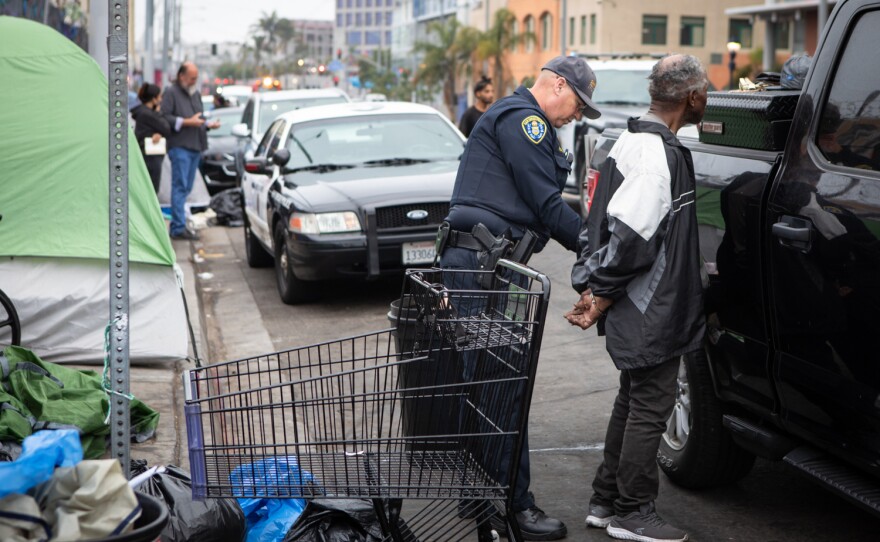
“If they don’t want to use them, it’s a free country, I understand that,” he said. “But it’s not without consequences.”
On the other hand, advocates have argued, and research has found, this approach isn’t effective.
Arrests and citations for these crimes are nowhere near pre-pandemic levels, but this action is coming at a time when experts are bracing for the latest surge in COVID-19 cases, and not long after San Diego was given the title of least affordable housing market in the nation.
The number of people living on the streets of San Diego has increased roughly 10% in two years — up from at least 2,283 in 2020 to 2,494 earlier this year, according to the homeless census, which is considered an undercount.
Gloria acknowledged the housing crisis, saying part of the problem is “the rent’s too damn high,” and that many people living on the streets aren’t there due to illness or bad choices, but because they “are simply poor.”
“I cannot let folks take advantage of San Diego’s deep (well) of compassion for this issue and wave away the help that they’re offered and the services that we’re providing, because sometimes they’re more comfortable on the streets and don’t want to take action to change their situation,” Gloria said.
inewsource reporters went to the East Village on multiple mornings in May and June to witness police interact with homeless people while city employees cleaned their encampments. Officers arrested six unhoused people for encroachment — an offense that was originally intended for trash cans blocking a sidewalk.
This week, a 59-year-old woman who didn’t want to be identified had received her third citation for encroachment in the past eight months. Police told her they would come back tomorrow and every day for the foreseeable future, and they would take her to jail if they see her again, she said.
“I don’t know where else to go,” she said. “It’s aggressive forcing us to go into the shelter.”
‘Reframing criminalization’
Records show arrests for encroachment and illegal lodging have been ramping up since the beginning of the year.
More than half of the arrests this year involve encroachment, the data shows. Arrests for illegal lodging have also increased — 17 arrests through June 3 compared to 16 in all of last year. Close to 90% of all arrests take place before noon, and the vast majority occur downtown.
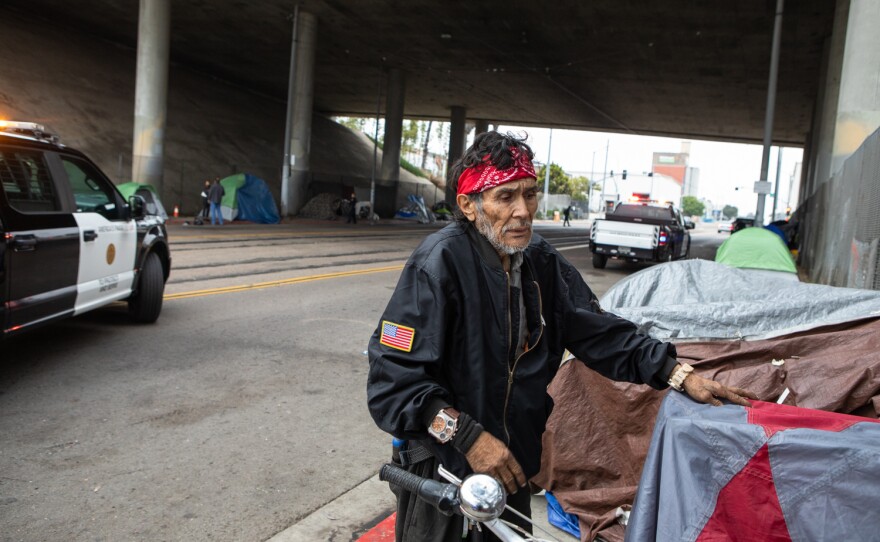
Following media reports of a growing encampment on Sports Arena Boulevard in February, city officials restarted their progressive enforcement efforts.
The model is a four-staged process of interactions between police officers and unhoused people, with an offer of shelter during each encounter. The first time an unhoused person refuses shelter, they’re given a warning. The second and third refusals will result in a citation. People are arrested when they refuse shelter after the fourth encounter.
“It's not OK,” Gloria said, “and we will continue to do what we can as compassionately as possible to help these individuals without simply allowing them to live and camp on our sidewalks, our streets.”
During Monday’s press conference, top city officials gathered to highlight citizen complaints about homeless encampments and the risks they pose, while celebrating the city’s efforts to expand shelter capacity by 25% and help get people off the streets.
The city fielded 1,200 complaints last week about homeless encampments through the city’s Get it Done app, Gloria said.
Officials pointed to outbreaks of shigella last year and hepatitis A that killed 20 people in 2017, saying homeless encampments pose a threat to overall public health and safety.
Police have enforced these laws throughout the pandemic, but arrests weren’t happening as frequently because the city didn’t have space in shelters, Gloria said. That is changing.
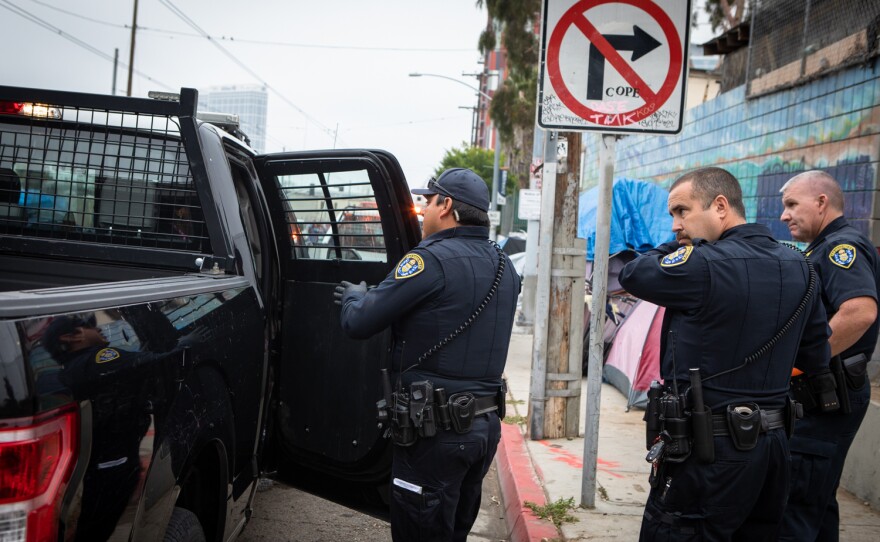
“We are investing an unprecedented amount of funds and staff resources to bring beds online quickly, creating suitable alternatives to living on the streets,” he said.
Gloria promised 450 beds by the end of the year, 150 of which are scheduled to open in Midway in July.
But researchers argue that this policing-led, shelter-first method is ineffective at addressing the issue of homelessness.
In an article published last year analyzing the condition of San Francisco's homeless support services, Harvard researcher, Chris Herring, argues that shelter beds are used as a tool by police to arrest, cite and confiscate property of unhoused people under the guise of public health.
“By reframing the criminalization of homelessness as public health and sanitation initiatives and reducing the concentration and number of tents in the most populated areas of the city,” the article said, “officials were largely successful in portraying their policies as effective, even while the number of unsheltered homeless in San Francisco rose significantly for the first time in over a decade.”
Studies have consistently found that criminalizing homelessness creates a cycle that only perpetuates the problem and increases the cost to taxpayers. One study conducted by the Urban Institute, a think tank focused on researching economic and social policy, put it this way:
“People experiencing homelessness often have trouble paying fines and appearing for court dates, which leads to more fines, new charges and bench warrants. These unresolved legal issues can result in even more encounters with the criminal legal system, including arrests and incarceration.”
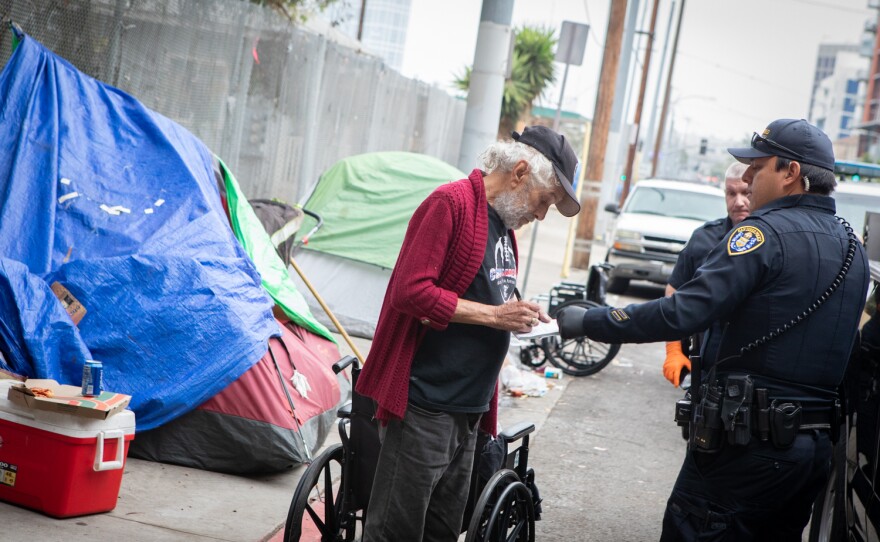
All of it only creates more barriers to housing.
Compassion on both sides
inewsource began monitoring the city’s approach to homeless encampments in March, following several posts on social media from homeless advocate Michael McConnell that accused city employees of breaking the law during encampment cleanups.
One post in particular showed a video of sanitation crews throwing a tent into a garbage truck with the caption, “The @CityofSanDiego just threw away this home and all the belongings inside without even looking through them.”
Courts have consistently ruled that homeless people are entitled to their personal belongings. In addition, San Diego is bound by a 2011 settlement that has been amended several times since. It spells out the rules for cleaning up — or abating — a homeless encampment.
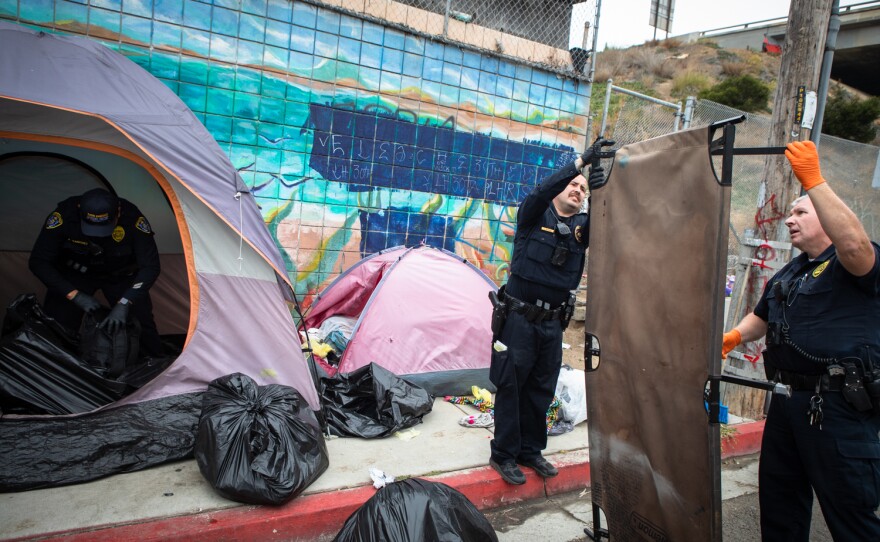
The city’s Environmental Services Department is required to post a three-hour notice prior to cleaning, and if any property appears abandoned, workers are supposed to go through each item and determine if it meets the threshold for impound. That threshold is:
- Valued at $100 or more
- Irreplaceable personal items
- Important documents
- Medicine
Tents, or any other property, that are thrown away are likely abandoned and have been damaged, soiled with pet or human feces and urine, or overrun by vermin, said Renee Robertson, director of Environmental Services.
“That doesn’t often get picked up on in the quick camera shots, but I can tell you that when you’re in the field you can see that and smell that,” she said.
While that appeared to be the case during each inewsource visit, a video McConnell posted seemingly showed two operational bikes that were thrown in the garbage. It received 561 shares as of Friday.
Crews rotate throughout the city every day looking for encampments that have a “significant waste load,” Robertson said. They post a three-hour notice for the people living there to pack up and move so they can go through and sweep the sidewalks. Some areas downtown have permanent notices of regular cleanups two or three days a week.
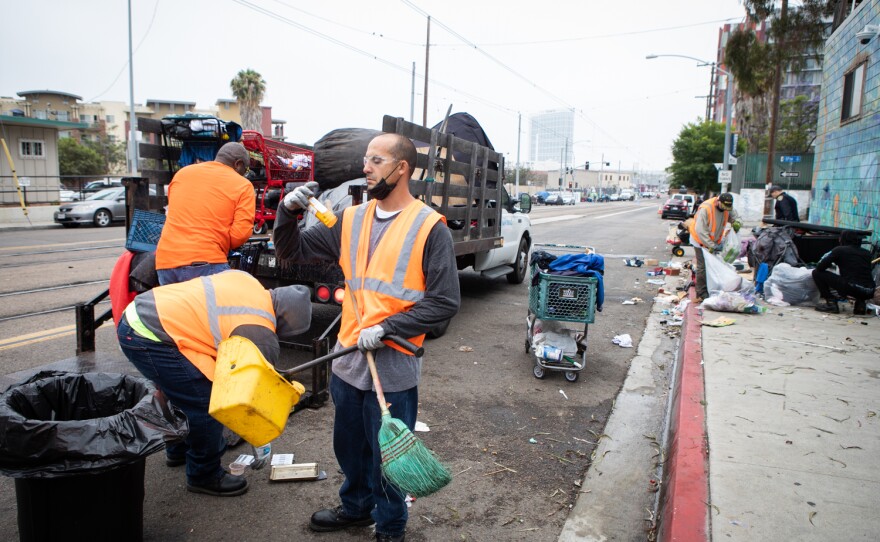
But several unsheltered people told inewsource there has been a marked increase in police activity and aggression in recent weeks.
During one visit downtown this week, several unhoused residents said it was the first time police had ever interacted with them.
Tianna Wilson, who also goes by “Snow,” said she has been living on the sidewalk on Second Avenue for several months. She received her first warning, but doesn’t have any interest in going to a shelter.
“I had good ones and bad ones. Every shelter is different,” she said.
Wilson, and several other residents, expressed concern about losing connections to outreach workers or other housing opportunities they are pursuing. Wilson said she is working with PATH, a nonprofit organization dedicated to ending homelessness, to arrange necessary documents for housing.
Breaking connections is a common problem, studies have found, that slow the process of building stability.
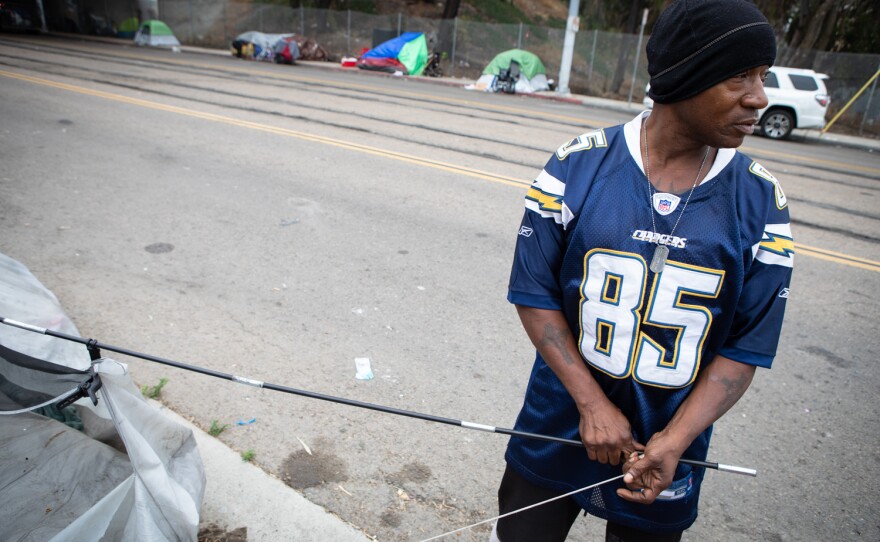
Striking a balance
Last month, Robertson invited inewsource to tag along as sanitation crews cleaned up an encampment on Second Avenue in downtown, next to the Four Points Sheraton. It was an opportunity to show what the city is up against.
Back then, the city’s main focus appeared to be trash.
Twenty tents were lining the sidewalks on both sides of the street. Garbage, food waste and clothing spilled out into the roadway, and pedestrians were forced to walk in traffic to pass. One resident approached city employees to complain about them allowing the mess to build up. After crews started to clean and people began moving their belongings down the street, another resident came to complain about the large number of unhoused people standing on the corner with their belongings. The city is constantly working to strike a balance, Robertson said.
“I have a lot of customers and I have to balance, and there’s compassion for me on both sides,” she said. When asked what she means by customers, she said, “Everyone who wants to use this sidewalk, including the person in the tent.”
An elderly woman was among those customers that day. The woman, who did not identify herself, had been sleeping on the sidewalk for months and appeared to be in the throes of a mental health crisis, yelling and screaming at people as they offered help to move her belongings.
After people moved her tent out of the way, several 12-ounce and 2-liter bottles filled to the brim with vomit and other waste were revealed. Some of it spilled onto the sidewalk and emitted a rancid stench.
“This is definitely stuff that we don’t want out,” Robertson said.
Homeless outreach workers arrived to help connect the woman with services, and a city contractor showed up to sanitize the sidewalk. The entire process was over by noon.
“We all need to work together to resolve this,” Robertson said.










